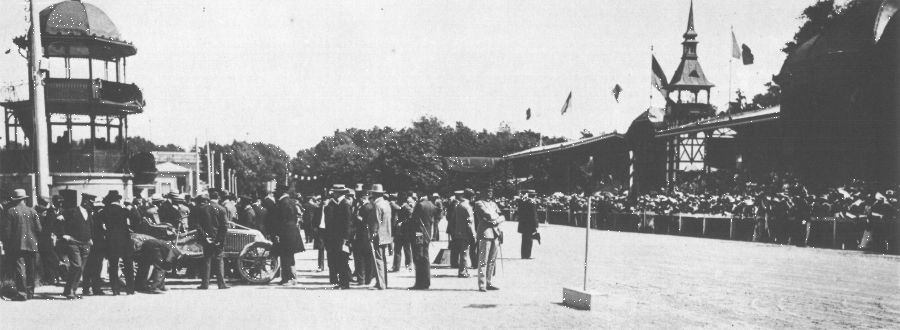|
Entry
Bulletin
Nennung
*
C.A.R. Autriche
Postfach 318
A-1210 Wien
| |
    
PARIS -
VIENNA 1902

2002 marks the centenary of the famous Paris-Vienna race which was so ably won by Marcel
Renault in what many people consider to be Renaultís greatest race victory of
all time.
The little 16 hp
Renaultís were Davids amongst the Goliaths of the big 70 hp Panhards, 60 hp
Mors, 40 hp Mercedes, etc. but they were to prove right the decision of Louis to
go for lightness and manoeuvrability rather than brute-force.
Another satisfying side
to this great victory was that it was the baptism of the new 4 cylinder Renault
engine which signified the breakaway from De Dion who had previously supplied
Renault with single and two cylinder engines.
What of the race itself.
Louis and Marcel Renault were entered in the light car class and, as was to be
expected, over the first stage from Champigny to Belfort which was fast and
relatively smooth the big 13.7 litre Panhards, the fastest racing cars of the
day, were well in the leaed. Nevertheless the two Renaultís were running well
and at Belfort Louis was 9th overall with Marcel 18th out
of a field of 137 starters.
Stage 2 from Belfort to
Bregenz was a neutral non-racing section because the Swiss did not approve of
motor racing.
Now came the real test
with the cars having to face the appallingly rough roads of Austria plus the
Arlberg pass, 5800 feet above sea level. It was under these conditions that the
Renault came into its own being nimbler, having better handling, better braking
and being less affected by the continuous, ruts, potholes and switch-backs of
the roads and tracks.
At Salzburg, Marcel
realising that because of troubles
he no longer had the support of his brother Louis, decided that it was now all
up to him and set off like one inspired. At that time four Panhards, one Darracq
and one Mercedes were still in front of the Renault.
The big cats with their
vast engines were taking a cruel pounding from the abominable roads, but Marcel
continued unrelentingly, catching and pulling away from his opponents until he
finally caught Maurice Farmanís Panhard, charged through the cloud of dust and
passed. Next to be caught was Zborowskiís Mercedes and finally it was Henri
Farman in his Panhard and Marcelís little Renault now led the entire race.
As the story goes, when
the Renault arrived at the Prater in Vienna it was completely unexpected because
they had been warned to expect the first car around 3 p.m. where as Marcel was
two hours early. At first he was considered a gate-crasher but finally the truth
dawned and the band had to be hurriedly dragged from their lunch to play the
Marseillaise.
What impressed the
Austrian people about this victory was that the Renault had beaten the Arlberg
Express by more than 7 hours and at that time this was considered the fastest
train in Europe.
With all due praise to
Marcel one should not lose sight of the very fine effort put up by Louis Renault
who was at one time leading his brother. Unfortunately, at the Innsbruck check
point Baron de Caterís Mercedes passed too close to the Renault catching a
rear wheel, bending the axle and breaking a road spring. Fuming, Louis Renault
and his mechanic Szisz toiled and sweated to repair the damage. After four hours
they set off again as night was falling. Louis, impatient to get on, would not
stop to light his lamps and consequently they did not see a closed level
crossing both gates of which they burst through, ending up with a bent front
axle, damaged radiator and worst of all a broken wheel.
Louis and Szisz removed
the axle and wheel and carried it off to a nearby village where they got the
blacksmith out of bed to assist Szisz to straighten the axle whilst Louis
Renault carved new spokes from chair legs, using a clasp knife, and rebuilt the
wheel.
They decided not to
attempt to repair the radiator and so with Louis at the wheel and Szisz lying
along the bonnet pouring pints of water into the boiling radiator they drove on.
So well did Louis drive that he had climbed right back up to 28th
overall at the finish but these two incidents had cost him too much time to
enable him to do better, although in this last stage he did manage to achieve
second best overall time.
Marcel Renaultís
victory was achieved with what was then a frightening 39 mph overall, all stops
included and it pushed home the lesson of power to weight which many people had
told Louis was too much of a gambler. However they had not taken into account
the mechanical genius of Louis Renault who believed that ĄPower was not all,
true progress means building light, yet strong.ď


|
